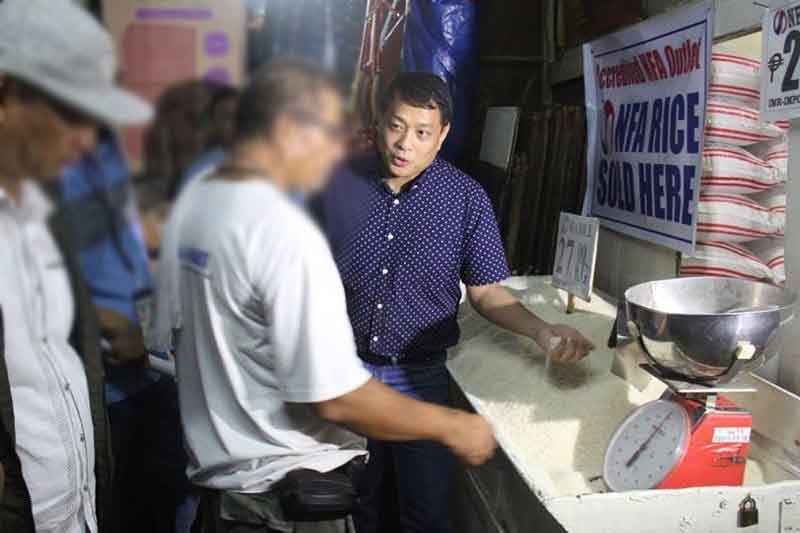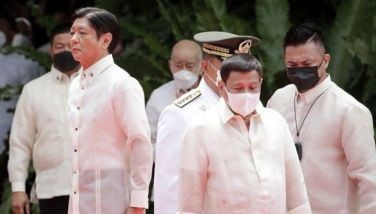NFA chief accused of diverting P5.1-billion fund

ROSALES, Pangasinan, Philippines — The president of the Samahan ng Industriyang Agrikultura (SINAG) filed graft charges yesterday against National Food Authority (NFA) administrator Jason Aquino and another official for allegedly diverting the agency’s P5.1-billion fund intended to stabilize price and supply of rice and corn.
In a 12-page complaint, SINAG president Rosendo So accused Aquino and Gerry Ambrosio, manager of the NFA accounting services department, of violating Section 3 (e) of Republic Act 3019 or the Anti-Graft and Corrupt Practices Act and Article 220 of the Revised Penal Code in connection with Republic Act 10924 or the General Appropriations Act of 2017.
SINAG is an umbrella group of 32 farmers and agriculture organizations that promote the development of the agriculture sector in the country.
NFA spokesman Rex Estoperez said the agency has yet to receive a copy of the complaint but maintained they are ready to answer anything.
“We can explain. We are ready to answer because we are not hiding anything,” Estoperez said.
NFA chief Aquino himself has yet to comment on the charges.
So alleged that NFA willfully, intentionally and feloniously disregarded the law and their mandate and used up the fund allocated to them under RA 10924, amounting to P5.1 billion, for payment of maturing obligations showing not only the blatant mismanagement of funds and placing the Philippines in an unstable position where people suffer from the continuing increase in prices of rice and corn.
He said that on Dec. 22, 2016, RA 10924 was signed by President Duterte, allocating P5.1 billlion to the NFA to be used specifically to stabilize the prices and supply of rice and corn.
So said the special provision in RA 10924 also directed the NFA to observe the following conditions in the utilization of the government subsidy: “The NFA shall buy directly from farmers, except in case of calamities, fortuitous events or shortfall in production, where the NFA is authorized to import rice and corn upon the recommendation of the NFA Council and approval by the President of the Philippines. The pricing schemes for imported rice and corn shall as far as practicable, consider the full recovery cost.”
So said on March 2, 2017, the entire fund was received by NFA from the Department of Budget and Management (DBM).
“Instead of using the same for the purpose the fund was established, NFA then caused P3,010,000,000 thereof to be deposited to the Philippine Treasury, as payment for a guarantee fee of P510,000,000 and contributed P2,500,000,000 to the Reserve Funds,” So said in his complaint.
He added that P1,046,000,000 and P1,044,000,000 were paid to Land Bank of the Philippines and the Development Bank of the Philippines, respectively, as payments of the principal and interests on their loans with the two banks.
So said these acts by NFA are enumerated clearly in the entries in the Commission on Audit (COA) 2017 Annual Audit Report (AAR) on the NFA.
He said that the COA further found that the diversion of the fund had severely affected the NFA’s Food Security Program last year, noting the shortfalls in the amount of palay procured from farmers as well as the subsidized NFA rice distributed in the market.
The entire P5.1-billion fund was diverted to other uses and not a single peso was used for its actual purpose – to ensure the stabilization of the prices and supplies of rice and corn, So said.
Based on records, So said the NFA posted a procurement shortfall in the total of 124,969 metric tons of palay in 2017, which might be partly attributed to unavailability of funds in the regional offices/field operating units during harvest season.
“NFA could have used the subsidy for additional incentives to farmers to level up and/or compete with local traders in order to attain its objective of providing market for farmers’ produce with fair return on their investment in production cost so as to encourage farmers to sell their produce to the agency,” So said.
So added that had the NFA attained its target procurement, it would not only have added to the mandatory buffer stock requirement, but would have likewise encouraged farmers to produce more and minimize the need to import rice, which utilizes foreign exchange reserves that eventually results in foreign or domestic borrowings for NFA.
He also said that the procurement shortfall affected other programs of NFA, such as rice distribution and buffer stocking resulting in higher price of rice, unavailability of NFA rice in the market and lower inventory of rice in various NFA warehouses.
So pointed out that since the first week of March 2017 when the P5.1 billion was received by NFA from the DBM, the prices of rice and corn have increased dramatically.
He said the NFA management explained that these actions of diverting the funds for payment of maturing obligations were done to save on financial expenses such as interest and documentary stamp tax, while the highest contributory factor to NFA’s losses is the financial charges due to its high level of outstanding debts.
Total savings on financial expenses with the immediate payment of maturing obligations of P2.090 billion amounted to P2.083 million and P2.564 million in interest expense and documentary stamps, respectively, or a total saving of P4.647 million.
Maintaining the idle/unutilized procurement fund of P2.090 billion as of March 2017 in the bank will only earn minimal interest of 0.10 percent (regular savings) to 0.25 (high yielding rate) per annum, compared to the savings in paying interest expenses for loans at the rate of 2.5 percent per annum aside from the savings on documentary stamp tax.
NFA said the fund would replenish partially the 2016 payment of 250,000 MT G-to-G (government to government) rice importation through a loan of P3.7 billion. This amount was not covered by the 2016 government subsidy, resulting in the reduction of NFA’s credit lines.
The fund was used to ease the agency’s depleting credit lines in February 2017, which had a deficit of P1.595 billion, NFA said.
However, So said these are not acceptable reasons under law, jurisprudence and even under their mandate that would help them escape their liability for technical malversation.
“The payment of maturing obligations is not even of noble intent, but rather a cowardly move to cover their mismanagement of funds that should have been used for these obligations which are wholly unrelated to the purpose for which the fund was allocated to NFA in the first place,” Sinag said.
NFA said in 2016 alone, its financial charges amounted to P6 billion, way higher than the agency’s operating expenses of P4 billion. – With Louise Maureen Simeon
- Latest
- Trending

































